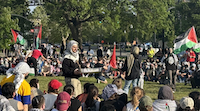WASHINGTON — President Joe Biden responded Thursday to weeks of protest on college campuses calling for a ceasefire in Gaza with a brief statement that the right to protest should be protected, but “not the right to cause chaos.”
“We are not an authoritarian nation where we silence people or squash dissent,” Biden said from the White House’s Roosevelt Room. “In fact, peaceful protest is in the best tradition of how Americans respond to consequential issues. But neither are we a lawless country.”
Biden said that the student-led protests have not made him reconsider policy in the Middle East and that he did not believe the National Guard should be authorized in response to protests across the country.
He criticized the protests that have led to classes being canceled.
“Dissent is essential to democracy, but dissent must never lead to disorder or to deny the rights of others so students can finish a semester or finish their college education,” Biden said. “Order must prevail.”
Students have set up encampments to protest the Israel-Hamas war at about 30 college campuses across the country, including Tulane University in Louisiana and the University of Wisconsin-Madison. Some have turned violent.
Fights broke out Tuesday night at UCLA when counter-protesters attempted to dismantle an encampment set up by protesters on the university’s campus, according to NPR.
“Violent protest is not protected,” Biden said. “Peaceful protest is.”
Student protesters have called for a ceasefire and for their institutions to divest from businesses that are tied to Israel, including companies that make weapons that have been used in the war.
More than 34,000 Palestinians have died in nearly seven months of war, according to the Gaza Health Ministry.
Universities have called in police to sweep the encampments, leading to about 1,300 arrests, according to The Guardian.
Calls from Congress
Lawmakers have also called on higher education institutions to quell the protests, and have raised concerns about antisemitism.
The House on Wednesday passed a bipartisan bill that would require the Department of Education to use the International Holocaust Remembrance Alliance’s definition of antisemitism.
Republicans and some Democratic advocates of the bill have argued that the protests are a form of antisemitism.
Critics of the bill say it could chill freedom of speech at educational institutions.
Nationwide protests began at Columbia University in New York on April 17 after the university’s president, Minouche Shafik, testified before the House Education and Workforce committee about antisemitism on college campuses.
Students pitched tents to establish a “Gaza Solidarity Encampment.” A day later Shafik authorized the New York Police Department to sweep the area. NYPD officers arrested 108 students – the largest mass arrest on Columbia’s campus since 1968, according to the independent student newspaper the Columbia Spectator.
After that sweep, students returned and stayed for two weeks until Tuesday, when hundreds of NYPD officers entered Columbia’s campus and cleared the encampments and Hamilton Hall, which students occupied, according to the Columbia Spectator.
R E L A T E D:
• • •• • •
This story is provided by Ohio Capital Journal, a part of States Newsroom, a national 501(c)(3) nonprofit. See the original story here.














